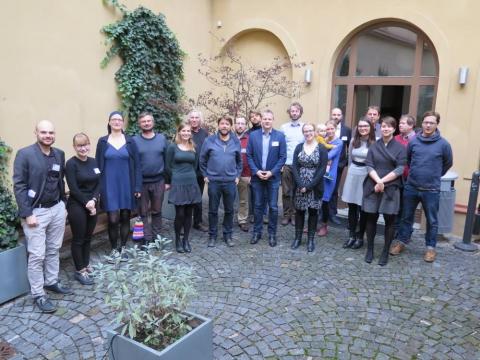Medieval Studies in Central Europe - Workshop in the Centre for Medieval Studies (CMS), Prague, 22-24 November 2018

Research on Central Europe has remained a topical issue on the common agenda of medievalists in Prague and Budapest since the changes in 1989. In the early 1990s, research on how the Middle Ages and its current perception shape the identity of the region was coordinated by scholars attached to two CEU campuses across the two capitals. Since 1998 the newly established Centre for Medieval Studies has become an essential hub of scholarship in Prague, and—under the direction of Petr Sommer and a new generation of scholars, Pavel Soukup, Pavlína Cermanová, Václav Žůrek, and many others—an indispensable part of the international scene. It was their initiative to strengthen the ties and renew the initial close contact with the Department of Medieval Studies at CEU, in cooperation with our alumna, Lucie Doležalová, Professor at Charles University in Prague.
The three-day workshop in Prague, eminently served this purpose. Between 22 and 24 November, 2018, seven faculty members and five doctoral students of our department (Olga Kalashnikova, Iliana Kandzha, Anna Kinde, Karen Stark, and Mária Vargha) joined more than a dozen Czech scholars and graduate students in presenting new and ongoing research projects at the CMS. Textual and philological studies were discussed side by side with research on intellectual, religious, social, and environmental history. The guests benefited from comments by experts in the host team and vice versa, and several opportunities for further cooperation emerged. Among the collaborative projects presented, one of the most important is the Oxford Handbook of Medieval Central Europe, edited under the auspices of the Medieval Central Europe Research Network (MECERN), to which colleagues both from the Czech Republic and at CEU Budapest contribute.
An evening visit to the library of Strahov Monastery, and the convivial conversations in the monastic brewery afterwards, added a further dimension to present and future collaboration. Besides the academic importance of the workshop, it was also a statement of solidarity in support of CEU, acknowledging its role in the intellectual formation of Central Europe in these challenging times. We are very grateful for the hospitality of our colleagues and hope to return it with an invitation to Budapest in the 2019-2020 academic year.